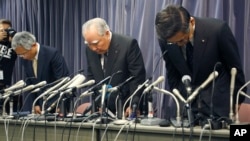Suzuki admitted to improper fuel economy testing methods on 16 of its automobile models since 2010 in a statement released Wednesday.
The company said the testing methods used were different from those required by Japanese rules, but that proper testing of the vehicles showed no need to amend the fuel economy data. Despite the irregular testing methods, Suzuki denied accusations that it had deliberately falsified data to make their vehicles seem more fuel efficient.
"Any wrongdoing, such as manipulation of fuel efficiency data, were not found," it said in the statement.
It also said the 16 models affected were sold only in Japan.
Suzuki stock plummeted 15 percent Wednesday after reports began circulating that the company could be tied to a mileage cheating scandal currently surrounding Mitsubishi motors.
After Mitsubishi motors was found to have used methods noncompliant with regulations, the Japanese government ordered all domestic automakers to investigate their fuel economy testing processes.
Suzuki is the third carmaker accused of falsifying environmental data in the past 12 months.
Germany's Volkswagen admitted late last year that it installed software on millions of its vehicles that activated bogus emissions controls to deceive testing officials.





